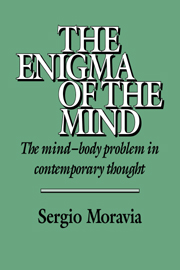Book contents
- Frontmatter
- Contents
- Preface to the English edition
- The enigma of the mind
- The enigma of the mind: Introduction to a metaphor
- 1 Toward a physical science of the mental: Feigl and the (re-)construction of the ‘mind–body problem’
- 2 The apogee of physicalism: The identity theory and materialism in the Australian school
- 3 The obscure relationship: Problems and debates surrounding the identity theory
- 4 Psychology as alchemy: The elimination of the mental in the ‘disappearance theory’
- 5 The mind as function: The functionalist approach to the mind–body problem
- 6 The mind as property and as event: The ‘reformist’ neo-identityism of Kim and Davidson
- 7 The mind as language: The linguistic turn in the mind–body problem
- 8 Speaking in many different ways: The pluralization of descriptions and explanations in the MBP
- 9 The mind as a mode of subjective experience: An interpretive model of the features of the mental
- 10 The mind as ‘subject’ and as ‘being-in-the-world’: Toward a non-mentalistic interpretation of the mental
- Appendix The mental as intentional/‘personal’ emergence: The psycho-personological perspective of Joseph Margolis
- Bibliography
- Name index
1 - Toward a physical science of the mental: Feigl and the (re-)construction of the ‘mind–body problem’
Published online by Cambridge University Press: 05 June 2012
- Frontmatter
- Contents
- Preface to the English edition
- The enigma of the mind
- The enigma of the mind: Introduction to a metaphor
- 1 Toward a physical science of the mental: Feigl and the (re-)construction of the ‘mind–body problem’
- 2 The apogee of physicalism: The identity theory and materialism in the Australian school
- 3 The obscure relationship: Problems and debates surrounding the identity theory
- 4 Psychology as alchemy: The elimination of the mental in the ‘disappearance theory’
- 5 The mind as function: The functionalist approach to the mind–body problem
- 6 The mind as property and as event: The ‘reformist’ neo-identityism of Kim and Davidson
- 7 The mind as language: The linguistic turn in the mind–body problem
- 8 Speaking in many different ways: The pluralization of descriptions and explanations in the MBP
- 9 The mind as a mode of subjective experience: An interpretive model of the features of the mental
- 10 The mind as ‘subject’ and as ‘being-in-the-world’: Toward a non-mentalistic interpretation of the mental
- Appendix The mental as intentional/‘personal’ emergence: The psycho-personological perspective of Joseph Margolis
- Bibliography
- Name index
Summary
The ‘Mental’ and the ‘Physical’: General Positions and the Concept of Knowledge
As we said in the Introduction, Herbert Feigl is generally considered the father of the reawakened interest in the mbp in this century. Spanning a period of some forty years (his first article on the psychophysical relationship appeared in 1934), Feigl's concern with the problem found its most extensive and systematic expression in the volume entitled The ‘Mental’ and the ‘Physical’, published in 1958. Certain theoretical and historical merits of this work should be pointed out immediately. Feigl approached the question of the relationship between mind and body with a deep awareness of its numerous scientific, epistemological, and ontological implications. He carried out his inquiry within a rather rich and stimulating context of positions and conceptions: logical empiricism, realism, materialism, behaviorism, the problems of reductionism and physicalism, the question of theoretical and observational languages, and so on. He firmly rejected doctrines that in one way or another refused to deal with the mbp out of hand: this is the case, in particular, with behavioral psychology (all too often incapable of considering the mental under any form but that of merely visible behavior) and with radical materialism, branded as “crass” by Feigl for its a priori refusal to recognize even the existence of anything else but matter. He was convinced, moreover, that a serious treatment of the mbp should provide an adequate account not only of the physical but also of the mental.
Information
- Type
- Chapter
- Information
- The Enigma of the MindThe Mind-Body Problem in Contemporary Thought, pp. 30 - 60Publisher: Cambridge University PressPrint publication year: 1995
